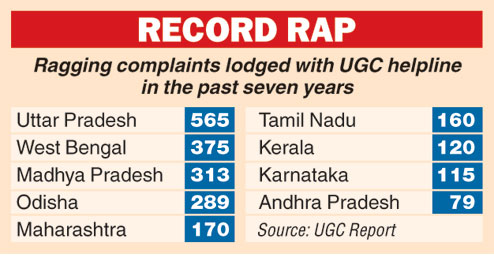Bengal ranks second only to Uttar Pradesh in the number of ragging incidents reported to the 24x7 helpline set up by the University Grants Commission, a dubious record attributed mainly to weak-kneed administrative response to complaints.
In the past seven years, 375 alleged ragging incidents on campuses in Bengal have been registered with the national anti-ragging helpline. According to data provided by the UGC, between 2009 and July 2015, Uttar Pradesh accounted for the highest number of cases at 565.
"It is a matter of concern that Bengal continues to be among the worst performers on the ragging list. Some states like Punjab have been able to reduce ragging to a considerable extent. But Bengal has failed to curb the menace," said Raj Kachroo, founder trustee of the Aman Satya Kachroo Trust, a Delhi-based NGO that manages and monitors the national ragging prevention programme on behalf of the UGC.
According to Kachroo, the number of complaints reaching the helpline would have been fewer had the state responded appropriately to any such incident. "The administration and the authorities of colleges where the incidents occur do not respond in an appropriate manner whenever there is a complaint of ragging," he said.
Ragging, a word far milder than the harassment, humiliation and even torture that freshers in colleges and universities are subjected to at the hands of their seniors, has been banned by the Supreme Court.
The UGC had set up the national helpline in 2006 and also fixed a set of procedures based on the court's directive to ensure that every case was investigated and justice delivered.
Kachroo said that the highest number of ragging complaints in Bengal were from engineering institutions, particularly private colleges affiliated to the West Bengal University of Technology. Whenever a student lodges a complaint, it is referred to the college head and the university.
Both the college and the university are supposed to respond immediately, but there is invariably a delay, Kachroo said.

Government-aided engineering institutions aren't any better, although Kachroo lauded Jadavpur University, the Indian Institute of Engineering Science and Technology in Shibpur and NIT Durgapur for "early signs of improvement".
At Jadavpur University, agitating students had forced the authorities to revoke punitive action against two students held guilty of ragging a junior in 2013. A section of officials too had rallied against vice-chancellor Souvik Bhattacharyya, playing their part in the duo getting away with an act banned by the Supreme Court.
The episode was also the trigger for vice-chancellor Bhattacharyya's resignation soon after.
The ragging complaint had been lodged by a second-year student of information technology against two seniors in the construction engineering and printing technology departments. One student was expelled for a year and another suspended for six months, which meant he couldn't even write his semester exams.
Students gheraoed the vice-chancellor, pro vice-chancellor and registrar for nearly 52 hours, demanding that the punishment be revoked. Bhattacharyya was forced to form a three-member committee to review the university's decision. He quit two weeks later and the two students who had been penalised were let off within another fortnight.
Subrata Kumar Dey, pro vice-chancellor of the West Bengal University of Technology, admitted that several institutions in the state didn't have a system in place to prevent ragging. "But we are trying our utmost to check the menace," he said.
The UGC's anti-ragging helpline receives fewer complaints from states like Karnataka, Andhra Pradesh, Maharashtra and Tamil Nadu, although the number of engineering institutes there far outnumber those in Bengal.
A study by a Calcutta-based NGO called Society Against Violence in Education reveals that students in many private colleges across Bengal are "frustrated and insecure" because of inadequate job opportunities in their state.
Kushal Banerjee, a spokesperson for the NGO, said the act of ragging had become an outlet for some of these students. "They tend to engage in activities like ragging because of the uncertainty about their careers."
The Supreme Court's guidelines make it mandatory for every higher education institute to have safeguards against ragging and a system that would ensure immediate response to a complaint about ragging along with prompt punitive steps against anyone found guilty.










